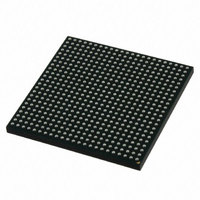MCIMX512CJM6C Freescale Semiconductor, MCIMX512CJM6C Datasheet - Page 84

MCIMX512CJM6C
Manufacturer Part Number
MCIMX512CJM6C
Description
MULTIMEDIA PROC 529-LFBGA
Manufacturer
Freescale Semiconductor
Series
i.MX51r
Specifications of MCIMX512CJM6C
Core Processor
ARM Cortex-A8
Core Size
32-Bit
Speed
600MHz
Connectivity
1-Wire, EBI/EMI, Ethernet, I²C, IrDA, MMC, SPI, SSI, UART/USART, USB OTG
Peripherals
DMA, I²S, LCD, POR, PWM, WDT
Number Of I /o
128
Program Memory Type
ROMless
Ram Size
128K x 8
Voltage - Supply (vcc/vdd)
0.8 V ~ 1.15 V
Oscillator Type
External
Operating Temperature
-20°C ~ 85°C
Package / Case
529-LFBGA
Operating Temperature (min)
-40C
Operating Temperature Classification
Industrial
Mounting
Surface Mount
Processor Series
i.MX51
Core
ARM Cortex A8
Data Bus Width
32 bit
Program Memory Size
36 KB
Data Ram Size
128 KB
Interface Type
I2C, SPI, SSI, UART, USB
Maximum Clock Frequency
200 MHz
Number Of Timers
5
Operating Supply Voltage
0.8 V to 1.15 V
Maximum Operating Temperature
+ 95 C
Mounting Style
SMD/SMT
3rd Party Development Tools
MDK-ARM, RL-ARM, ULINK2
Development Tools By Supplier
MCIMX51EVKJ
Minimum Operating Temperature
- 40 C
Lead Free Status / RoHS Status
Lead free / RoHS Compliant
Eeprom Size
-
Program Memory Size
-
Data Converters
-
Lead Free Status / Rohs Status
Compliant
- Current page: 84 of 200
- Download datasheet (6Mb)
Electrical Characteristics
A frame starts with a rising edge on SENSB_VSYNC (all the timings correspond to straight polarity of the
corresponding signals). Then SENSB_HSYNC goes to high and hold for the entire line. Pixel clock is
valid as long as SENSB_HSYNC is high. Data is latched at the rising edge of the valid pixel clocks.
SENSB_HSYNC goes to low at the end of line. Pixel clocks then become invalid and the CSI stops
receiving data from the stream. For next line the SENSB_HSYNC timing repeats. For next frame the
SENSB_VSYNC timing repeats.
4.7.8.1.3
The timing is the same as the gated-clock mode (described in
except for the SENSB_HSYNC signal, which is not used. See
valid and cause data to be latched into the input FIFO. The SENSB_PIX_CLK signal is inactive (states
low) until valid data is going to be transmitted over the bus.
The timing described in
different timing. The CSI can be programmed to support rising/falling-edge triggered SENSB_VSYNC;
active-high/low SENSB_HSYNC; and rising/falling-edge triggered SENSB_PIX_CLK.
4.7.8.2
Figure 51
the IPU.
84
SENSB_DATA,
SENSB_VSYNC,
SENSB_HSYNC
SENSB_PIX_CLK
(Sensor Output)
SENSB_DATA[19:0]
depicts the sensor interface timing. SENSB_MCLK signal described here is not generated by
SENSB_PIX_CLK
SENSB_VSYNC
Electrical Characteristics
Non-Gated Clock Mode
i.MX51 Applications Processors for Consumer and Industrial Products, Rev. 4
Start of Frame
Figure 50
invalid
Figure 50. Non-Gated Clock Mode Timing Diagram
nth frame
Figure 51. Sensor Interface Timing Diagram
is that of a typical sensor. Some other sensors may have a slightly
1st byte
IP3
IP2
n+1th frame
Section 4.7.8.1.2, “Gated Clock
invalid
Figure
1/IP1
50. All incoming pixel clocks are
1st byte
Freescale Semiconductor
Mode”),
Related parts for MCIMX512CJM6C
Image
Part Number
Description
Manufacturer
Datasheet
Request
R
Part Number:
Description:
MCIMX-LVDS1
Manufacturer:
Freescale Semiconductor
Datasheet:
Part Number:
Description:
Manufacturer:
Freescale Semiconductor, Inc
Datasheet:
Part Number:
Description:
Manufacturer:
Freescale Semiconductor, Inc
Datasheet:
Part Number:
Description:
Manufacturer:
Freescale Semiconductor, Inc
Datasheet:
Part Number:
Description:
Manufacturer:
Freescale Semiconductor, Inc
Datasheet:
Part Number:
Description:
Manufacturer:
Freescale Semiconductor, Inc
Datasheet:
Part Number:
Description:
Manufacturer:
Freescale Semiconductor, Inc
Datasheet:
Part Number:
Description:
Manufacturer:
Freescale Semiconductor, Inc
Datasheet:
Part Number:
Description:
Manufacturer:
Freescale Semiconductor, Inc
Datasheet:
Part Number:
Description:
Manufacturer:
Freescale Semiconductor, Inc
Datasheet:
Part Number:
Description:
Manufacturer:
Freescale Semiconductor, Inc
Datasheet:
Part Number:
Description:
Manufacturer:
Freescale Semiconductor, Inc
Datasheet:
Part Number:
Description:
Manufacturer:
Freescale Semiconductor, Inc
Datasheet:
Part Number:
Description:
Manufacturer:
Freescale Semiconductor, Inc
Datasheet:
Part Number:
Description:
Manufacturer:
Freescale Semiconductor, Inc
Datasheet:










